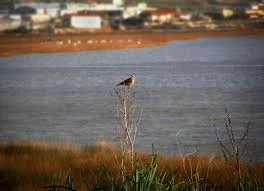Bird populations across Europe have experienced sharp declines - a staggering 421 million birds over the past 30 years - with the majority of losses from the most common species, a research shows.
The decline in bird populations can be linked to modern farming methods, deterioration of the quality of the environment and habitat fragmentation, the study noted.
Around 90 percent of these losses were from the 36 most common and widespread species, including house sparrows, skylarks, grey partridges and starlings.
"It is very worrying that the most common species of bird are declining rapidly because it is this group of birds that people benefit from the most," said Richard Inger from the University of Exeter in Britain.
The researchers noted that thanks to direct conservation action and legal protection in Europe, the numbers of some less common birds have risen.
The numbers of great tits, robins, blue tits and blackbirds were all shown to be increasing.
Populations of rarer species, including marsh harriers, ravens, buzzards and stone curlews have also increased in recent years.
The conservation and legal protection of all birds and their habitats in tandem are essential to reverse declines in the most common species of birds, the researchers highlighted.
"This is a warning from birds throughout Europe. It is clear that the way we are managing the environment is unsustainable for many of our most familiar species," concluded Richard Gregory from the Royal Society for the Protection of Birds in Britain.
Source: dayafterindia.com
[indian.ruvr.ru]
3/11/14
The decline in bird populations can be linked to modern farming methods, deterioration of the quality of the environment and habitat fragmentation, the study noted.
Around 90 percent of these losses were from the 36 most common and widespread species, including house sparrows, skylarks, grey partridges and starlings.
"It is very worrying that the most common species of bird are declining rapidly because it is this group of birds that people benefit from the most," said Richard Inger from the University of Exeter in Britain.
- Birds provide multiple benefits to society. They help to control agricultural pests, are important dispersers of seeds, and scavenging species play a key role in the removal of carcasses from the environment.
The researchers noted that thanks to direct conservation action and legal protection in Europe, the numbers of some less common birds have risen.
The numbers of great tits, robins, blue tits and blackbirds were all shown to be increasing.
Populations of rarer species, including marsh harriers, ravens, buzzards and stone curlews have also increased in recent years.
The conservation and legal protection of all birds and their habitats in tandem are essential to reverse declines in the most common species of birds, the researchers highlighted.
"This is a warning from birds throughout Europe. It is clear that the way we are managing the environment is unsustainable for many of our most familiar species," concluded Richard Gregory from the Royal Society for the Protection of Birds in Britain.
Source: dayafterindia.com
[indian.ruvr.ru]
3/11/14


 GR
GR FR
FR DE
DE ES
ES IT
IT RU
RU EU
EU